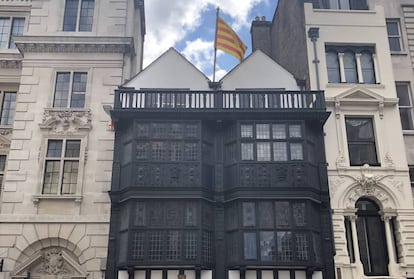‘Benvinguts’ to London’s ‘House of Catalonia’
The Catalan regional government is funding a delegation inside a Tudor-style mansion in the UK capital, where personnel work to promote trade and “explain the institutional situation”

Cities reinvent their own image over the years, concealing or revealing themselves as required. In 1900, for example, one of the few surviving Tudor-style buildings left in the City of London emerged from under several layers of whitewash and wood paneling.
The building survived the Great Fire of London in 1666, and for many years it was a passageway to the Inner Temple, the professional association for some of the most prestigious lawyers in town.
There is a lot of ignorance and demagoguery when it comes to the job that we do
Sergi Marcén, Catalan representative to the UK
But these days it is home to the “House of Catalonia,” so named barely a year ago, when the suspension of regional powers in Catalonia was lifted. Just like the House of Gibraltar, the House of Catalonia follows in the wake of other territories without powers over external affairs but a desire to engage in de facto diplomatic outreach work.
“There is a lot of ignorance and demagoguery when it comes to the job that we do,” says Sergi Marcén, the Catalan “ambassador” to the UK. His business card reads: “Representative of the Government.”
“We are merely representatives in this country for the promotion of all areas and sectors where the Catalan government has powers: economy, tourism, culture and institutional affairs,” he says. Every year, two million British tourists travel to Catalonia and spend an average of €200 a day.
The building survived the Great Fire of London in 1666, and for many years it was a passageway to the Inner Temple
But featuring prominently on display is a plastic ballot box – one of 6,000 that were used in the illegal independence referendum held on October 1, 2017 despite warnings from the Constitutional Court that doing so would violate Spanish legislation.
The Spanish Foreign Ministry, which has asked the Catalan High Court to order the precautionary closure of several of these delegations abroad, argues that their activities “coincide with the goals of the secessionist process in Catalonia with singular intensity.”
But Marcén seems outraged at the notion. “We explain the institutional situation in Catalonia. We are the Catalan government’s delegates,” he says.
- “And what is this institutional situation? How do you explain to an English person what’s going on there?”
- “We tell them that there’s a political conflict that needs to be resolved. That there are two million citizens demanding the right to self-determination, as well as another two million Catalans who oppose it. And if they ask us about the defendants on trial at the Supreme Court, we describe them as political prisoners, because that is what they are. Everyone knows that there was no rebellion or violence there.”
- “But perhaps for those two million non-separatist Catalans, it’s not so much a political conflict as a legal conflict arising from having broken the law...”
- “Yes, but that’s what the ballot boxes are for. It was the other side that won.”
Spread over three floors, the delegation has offices for culture, tourism, trade and investment. “It’s a lot of work,” says Oscar Martí, who heads the Catalan Office for Trade and Investment. “Around 25% of Catalan companies export to the UK, and there are growing numbers of British companies that are interested in the Catalan market, especially in the field of software and technology.”
The building is staffed by around 30 people who, for now at least, do not seem too concerned about the possibility that the Spanish government might succeed in shutting down the House of Catalonia. Perhaps they suspect there will be a lengthy legal battle before that happens, if it does at all.
- “But is it normal for you to host Carles Puigdemont, who is a fugitive from Spanish justice?” (The former Catalan premier, who fled Spain after the unilateral independence declaration, was in London last May.)
- “If Puigdemont shows up, as the 130th Premier of the Generalitat, we show him full support, just as we would to [former regional premiers] Jordi Pujol or José Montilla.”
English version by Susana Urra.
Tu suscripción se está usando en otro dispositivo
¿Quieres añadir otro usuario a tu suscripción?
Si continúas leyendo en este dispositivo, no se podrá leer en el otro.
FlechaTu suscripción se está usando en otro dispositivo y solo puedes acceder a EL PAÍS desde un dispositivo a la vez.
Si quieres compartir tu cuenta, cambia tu suscripción a la modalidad Premium, así podrás añadir otro usuario. Cada uno accederá con su propia cuenta de email, lo que os permitirá personalizar vuestra experiencia en EL PAÍS.
¿Tienes una suscripción de empresa? Accede aquí para contratar más cuentas.
En el caso de no saber quién está usando tu cuenta, te recomendamos cambiar tu contraseña aquí.
Si decides continuar compartiendo tu cuenta, este mensaje se mostrará en tu dispositivo y en el de la otra persona que está usando tu cuenta de forma indefinida, afectando a tu experiencia de lectura. Puedes consultar aquí los términos y condiciones de la suscripción digital.









































